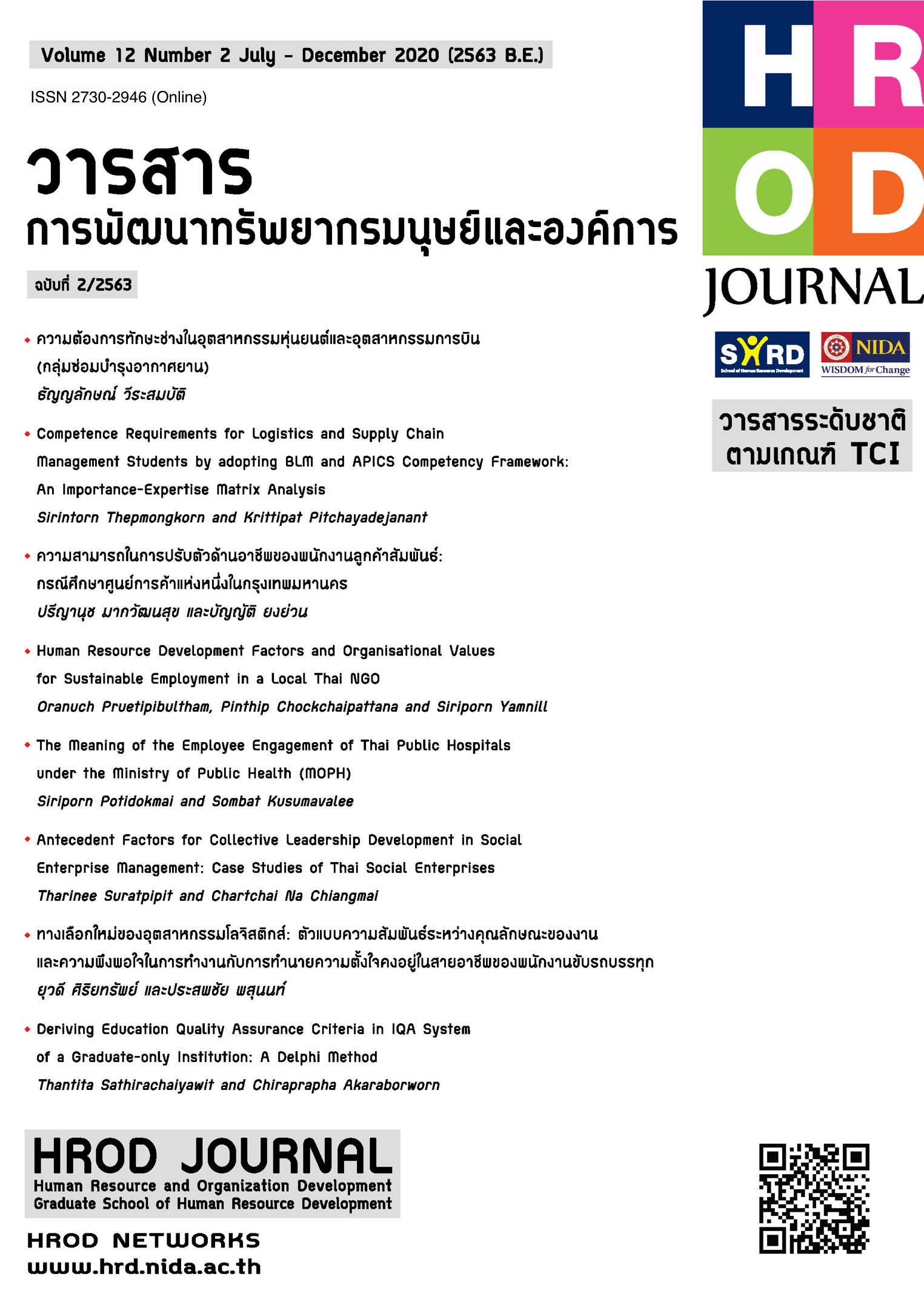Career Adaptability of Customer Relation Officer: A Case Study of Shopping Complex in Bangkok
Main Article Content
Abstract
The purpose of this research was to study the career adaptability of customer relation officers at a shopping complex in Bangkok. The qualitative study was conducted by using in-depth interview with 10 female customer relation officers and 2 customer relation supervisors with including Non-participant observation on customer relation officer’s work. Data was collected during May to September 2018. The results of the study showed that the career adaptability of customer relation officers were as follows: 1) career concern could be classified officers into 2 categories as the officers who have career plan will have career goal and the officers who have no career plan will work to discover their appropriate job, 2) career control was expressed in term of responsibility on duties assigned and providing customers assistance with solution of situations, 3) career curiosity of customer relation officers was expressed on the officers who have interested in information searching, knowledge and having intention for self-development in languages skill to implementing on customer relation work, and 4) career confidence was reflected on the officers who have confidence in their duties, realizing self-potential, having confidence to be practice and improve their selves and recognizing in their weakness.
Article Details
1) The content of article in HROD journal is the author’s wholly responsibility to research, analyze, summarize, compile, and reference data. The editorial department will not be responsible in anyway.
2) The submitted articles in HROD journal must be unpublished before and must not be currently under consideration for publication elsewhere. If it is detected for its repetition, the author must be responsible for infringement of copyright.
3) Authors will be asked to transfer copyright of the article to the Publisher. The article is prohibited to reproduce all or part of the text, unless allowed.
References
เอกสารอ้างอิง (References)
นันทา สู้รักษา. (2548). รูปแบบชีวิตและการให้คำปรึกษาอาชีพ. กรุงเทพมหานคร: ภาควิชาการแนะแนวและจิตวิทยาการศึกษา คณะศึกษาศาสตร์ มหาวิทยาลัยศรีนครินทรวิโรฒ.
นาฎวดี จำปาดี. (2554). การรับรู้ความสามารถของตนเอง รูปแบบความคิดสร้างสรรค์ และปัจจัยส่วนบุคคลที่มีต่อพฤติกรรมการสร้างสรรค์นวัตกรรม: กรณีศึกษาบริษัทผู้ให้คำปรึกษาและพัฒนาระบบคอมพิวเตอร์แห่งหนึ่ง (วิทยานิพนธ์ปริญญามหาบัณฑิต). มหาวิทยาลัยธรรมศาสตร์ม กรุงเทพฯ.
ฝ่ายวิจัย บริษัทคอลลิเออร์ส อินเตอร์เนชั่นแนล ประเทศไทย. (2561). รายงานการวิจัยกรุงเทพมหานครพื้นที่ค้าปลีก ไตรมาสที่ 1 2561.
Coetzee, M. & Harry, N. (2015). Gender and hardiness as predictors of career adaptability: an exploratory study among black call centre agents. South African Journal of Psychology, 45(1), 81-92. doi:10.1177/0081246314546346 sap.sagepub.nav.
Fiori, M., Bollmann, G., & Rossier, J. (2015). Exploring the path through which career adaptability increases job satisfaction and low job stress: The role of affect. Journal of Vocational Behavior, 91, 113-121. doi.org/10.1016/j. jvb.2015.08.010.
Omar, S., & Noordin, F. (2013). Career adaptability and intention to leave among ICT professionals: An exploratory study. The Turkish Online Journal of Education Technology, 12(4), 11-18.
Savickas, M. L. (1997). Career adaptability: An integrative construct for life-span, life-space theory. Career development quarterly, 45(3), 247-259.
Savickas, M. L. (2005). The theory and practice of career construction. In S. D. Brown & R. W. Lent (Eds.), Career development and counseling: Putting theory and research to work (pp. 42-70), Hoboken, NJ: John Wiley & Sons, Inc.
Savickas, M. L. (2013). Career construction theory and practice. In. S. D. Brown, & R. W. Lent (Eds.), Career development and counseling: Putting theory and research to work, second edition, (pp. 147-183). Hoboken, NJ: John Wiley & Sons, Inc.
Santilli, S., Marcionetti, J., Rochat, S., Rossier, J., & Nota, L. (2017). Career adaptability, hope, optimism, and life satisfaction in Italian and Swiss Adolescents. Journal of Career Development, 44(1), 62-76. doi: 10.1177/0894845316633793journals.sagepub.com/home/jcd
Taber, B. J., & Blankemeyer, M. (2014). Future work self and career adaptability in the prediction of proactive career behavior. Journal of Vocational Behavior, 86, 20-27. http://dx.doi.org/10.1016/j.jvb.2014.10.005.
Zacher, H. (2014). Individual difference predictors of change in career adaptability overtime. Journal of Vocational Behavior, 84, 188-198. http://dx.doi.org/10.1016/j.jvb.2014.01.001.
Zacher, H. (2015). Daily manifestation of career adaptability: Relationhips with job and career outcomes. Journal of Vocational Behavior, 91, 75-68. http://dx.doi.org/10.1016/j.jvb.2015.09.003.
แปลงเอกสารอ้างอิงภาษาไทยเป็นภาษาอังกฤษ (Translated Thai References)
Nanta, S. (2005). Rupbæp chiwit læ kanhai kham prưksa achip [Life patterns and career counseling]. Bangkok: Guidance and education psychology Faculty of education, Srinakharinwirot University.
Nadvadee J. (2011). Kanrapru khwamsamat kho̜ng ton eng rupbæp khwamkhit sangsan læ patchai suan bukkhon thi mi to phrưttikamkan sangsan nawattakam : korani sưksa borisat phu hai kham prưksa læ phatthana rabop khomphiutœ hæng nưng [Effect of self-efficacy, creative styles and individual factor to innovative work behavior : a case study of a software house ] (Master’ s thesis). Thammasat University, Bangkok.
Research department of Colliers international Thailand. (2018). Raingan kanwichai Krung Thep Maha Nakhon phưnthi kha plik trai mat thi 1 2018 [Bangkok Retail Area Research Report Q1 2018].


